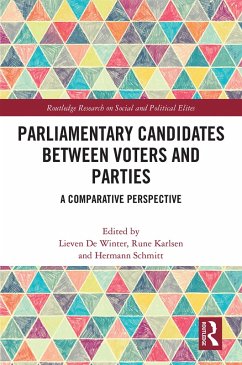
How Political Parties Respond (eBook, PDF)
Interest Aggregation Revisited
Versandkostenfrei!
Sofort per Download lieferbar
45,95 €
inkl. MwSt.
Weitere Ausgaben:

PAYBACK Punkte
23 °P sammeln!
How Political Parties Respond focuses specifically on the question of interest aggregation. Do parties today perform that function? If so, how? If not, in what different ways do they seek to show themselves responsive to the electorate?This fascinating book studies these questions with reference to Great Britain, France, Germany, Italy, Spain, Denmark, Norway, Sweden, and Canada. A chapter on Russia demonstrates how newly powerful private interest groups and modern techniques of persuasion can work together to prevent effective party response to popular interests in systems where the authorita...
How Political Parties Respond focuses specifically on the question of interest aggregation. Do parties today perform that function? If so, how? If not, in what different ways do they seek to show themselves responsive to the electorate?
This fascinating book studies these questions with reference to Great Britain, France, Germany, Italy, Spain, Denmark, Norway, Sweden, and Canada. A chapter on Russia demonstrates how newly powerful private interest groups and modern techniques of persuasion can work together to prevent effective party response to popular interests in systems where the authoritarian tradition remains strong.
This fascinating book studies these questions with reference to Great Britain, France, Germany, Italy, Spain, Denmark, Norway, Sweden, and Canada. A chapter on Russia demonstrates how newly powerful private interest groups and modern techniques of persuasion can work together to prevent effective party response to popular interests in systems where the authoritarian tradition remains strong.
Dieser Download kann aus rechtlichen Gründen nur mit Rechnungsadresse in A, B, BG, CY, CZ, D, DK, EW, E, FIN, F, GR, HR, H, IRL, I, LT, L, LR, M, NL, PL, P, R, S, SLO, SK ausgeliefert werden.













